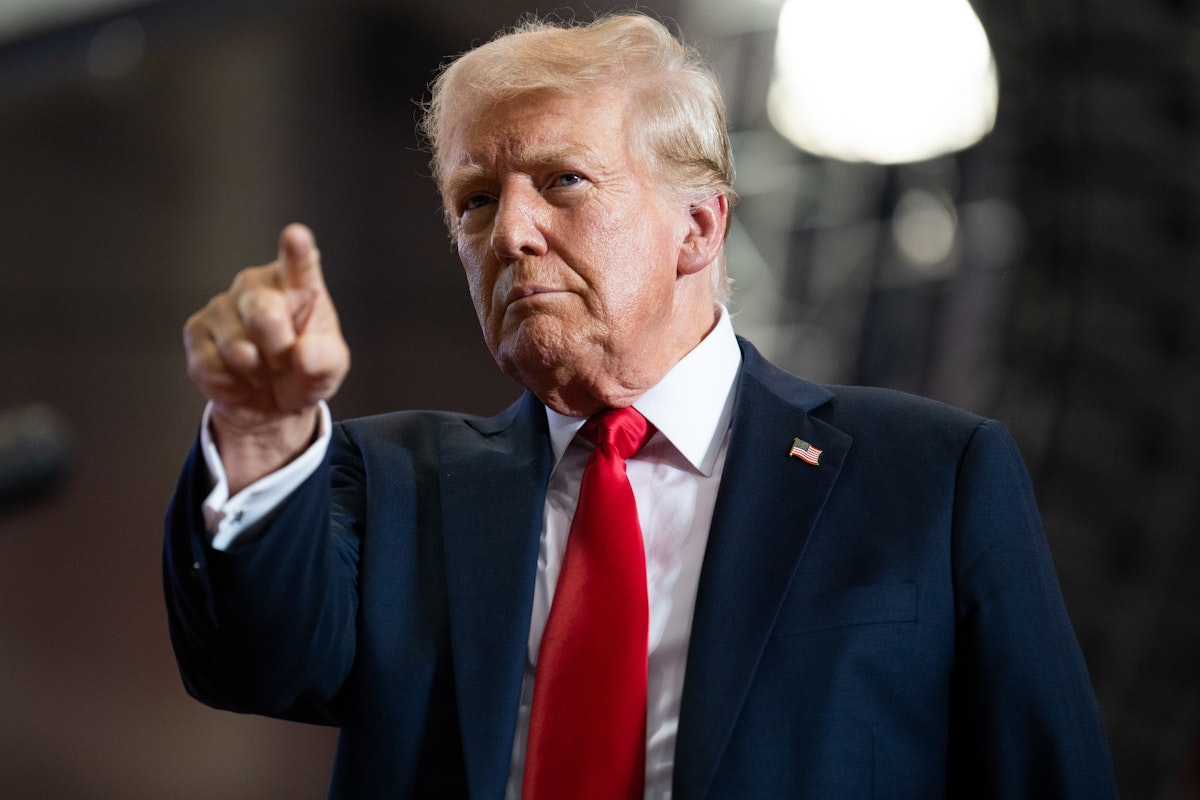Ukrainian Paralympian triumphs over disability: from war-torn Donetsk to Paris 2024
Rail accident, disability, has Oleksiy Kharlamov pushing for better accessibility in Ukraine
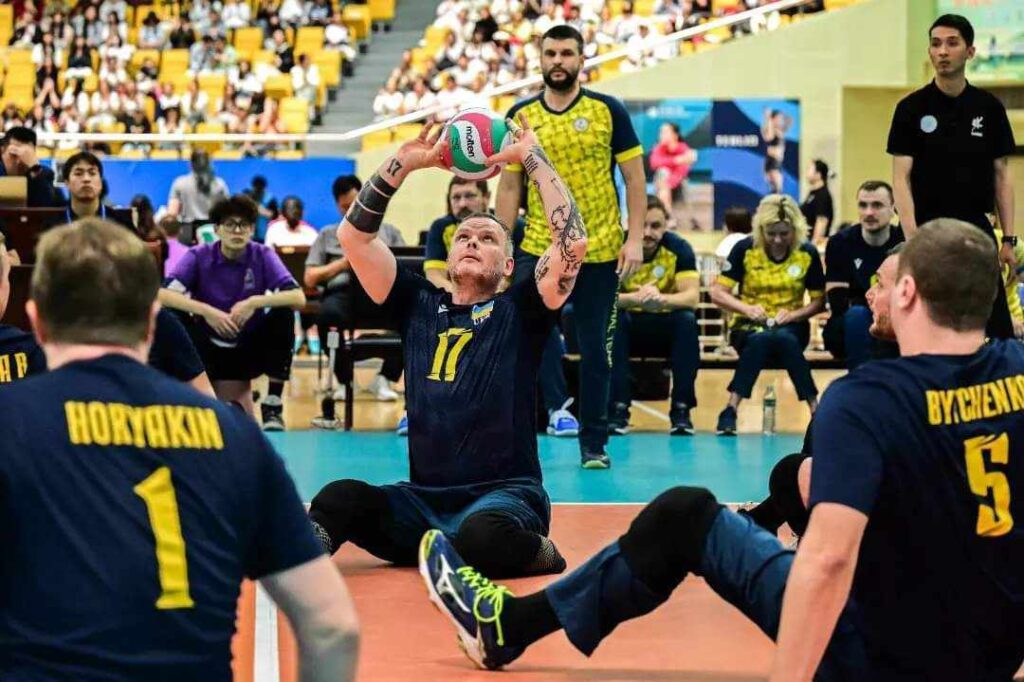

Oleksii Kharlamov’s journey into the world of volleyball, eventually to become a member of Ukraine’s Paralympic team, began unexpectedly. In a period before the widespread use of the Internet, Kharlamov was discovered by the coach of a local team in Donetsk. This chance encounter led him to begin training, and just two years later, in 2003, he was playing for the Ukrainian national volleyball team.
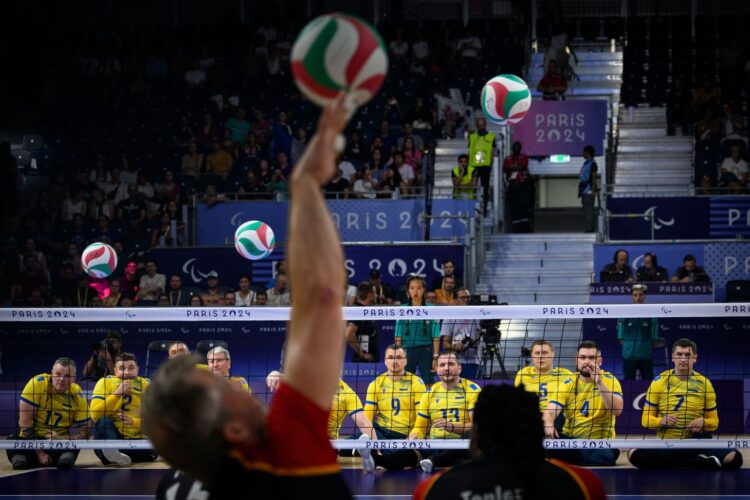
Originally from Donetsk, Kharlamov and his family were forced to leave their home in 2014 when the Russians invaded the Donbas and became internally displaced persons (IDPs).
Kharlamov has always been passionate about sports. “I used to play football as a child before my injury, then basketball at the university level,” he says.
Then, one day in 1999, as he was trying to board a train, he stumbled and fell under the wheels. He was only 20 years old, so it was an incredibly difficult time for him, but his family and friends were very supportive.
“In the hospital, I immediately began searching for a Paralympic sport I could pursue. I’d been active in sports before. It was tough, but I received a lot of psychological support. Before long, I found the sport I wanted to practice.”
After his injury, volleyball became a natural fit for him, given the nature of his injury. Although he experimented with wheelchair basketball, he found it challenging to constantly rely on a wheelchair for mobility. His coach even suggested he take the wheelchair home and practice in the streets, but Kharlamov preferred to walk around using his prostheses.
A typical day for Kharlamov involves balancing his commitments as an athlete, a coach, and a volunteer. Since Russia’s full-scale invasion on 24 February 2022, he has been actively involved in volunteer work. His daily routine involves commuting, training sessions, and coaching at a fitness club, where he helps others achieve their athletic goals.
At the end of a long day, he returns home alone. Kharlamov and his wife are divorced. His daughter, currently in Germany with her mother following the Russian invasion, remains a central focus of his thoughts.
“This is very difficult for me because my daughter is very important to me,” Kharlamov says. He looks forward to her return when he will once again be involved in her education and daily activities.
Kharlamov’s drive and motivation come from a deep-seated passion for sports, which has always been a part of him. “I’ve been an athlete since childhood, and I’m motivated by the desire to win,” he says.
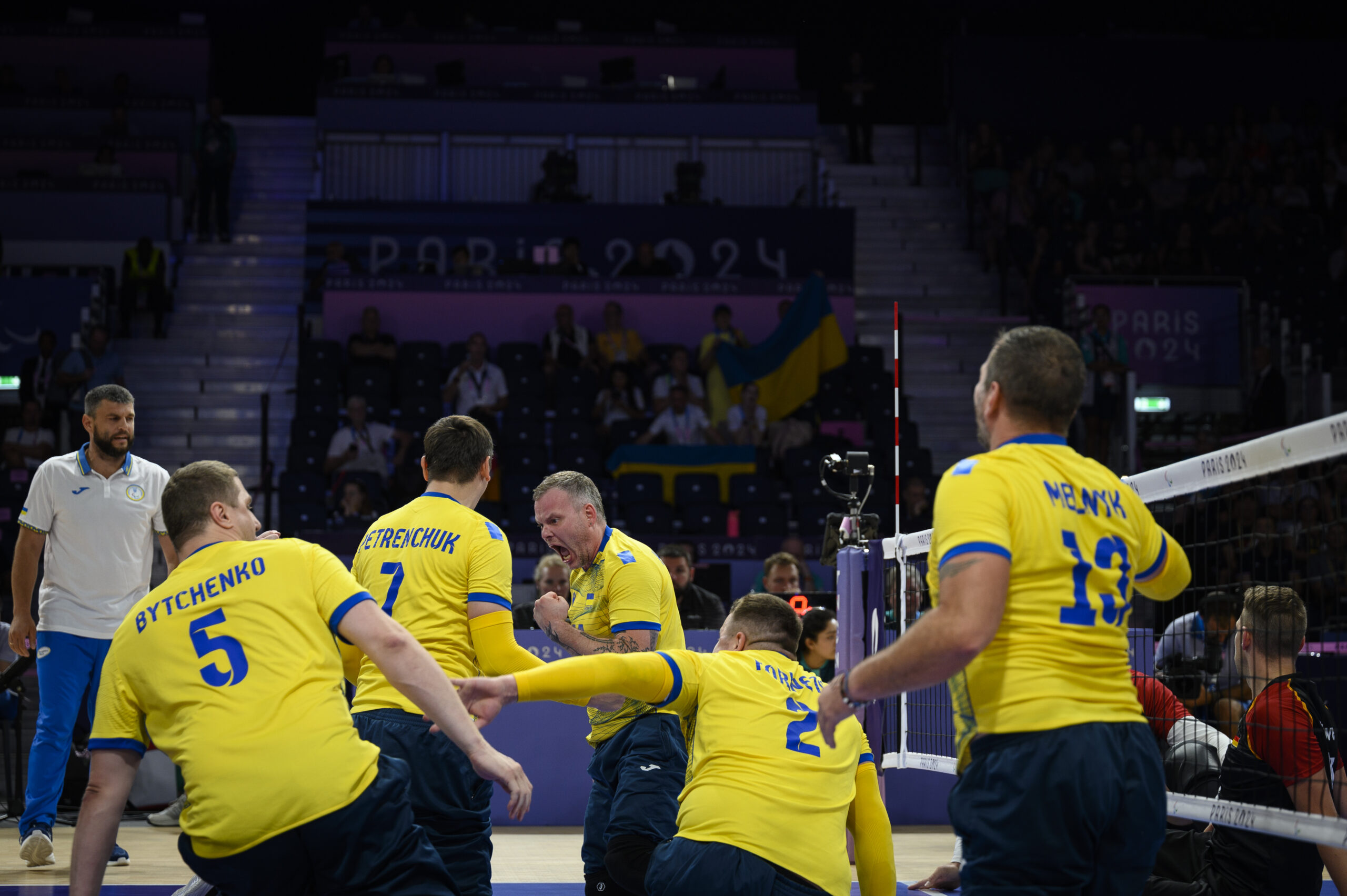
His motivation is now fueled by his love for his daughter, his family, and his team. The desire to win and help his country keeps him going. He is committed to fighting for Ukraine on every front, both on and off the court.
Before competitions, Kharlamov and his team have a special ritual – they sing along to Chervona Ruta, a popular Ukrainian song performed by Sofia Rotaru. “Well, actually, she sings, and we sing along with the whole team,” he says. This shared tradition strengthens their bond and prepares them mentally for the challenges ahead.
Kharlamov finds pleasure and relaxation in music and family connections, especially his daughter, to manage the stress and pressure of being a top athlete.
“I generally try to take my guitar with me, and it helps me. Music is there for me; it also helps me when I talk to my daughter,” he shares, emphasizing the importance of these simple joys of life in his daily routine.
Kharlamov’s career is marked by significant achievements, including a second-place finish at the European Championships, a third-place at the World Championships, and a fifth-place finish at the 2016 Paralympic Games in Rio. These accomplishments, however, are currently set against the backdrop of the ongoing war in Ukraine, which has complicated training and competition logistics.
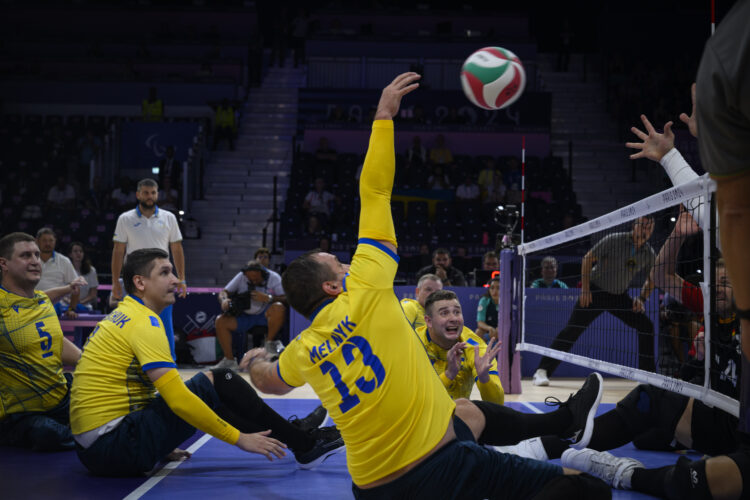
The war has brought unique challenges to the team, both physically and mentally. Air raid alarms, concerns for family members, and the difficult journeys to competitions weigh heavily on the athletes. “It takes us two days to get somewhere in Europe,” Kharlamov notes, describing the exhausting travel routes across Ukraine and the border and then on to the venues.
“For example, first we travel through the territory of Ukraine, then to Warsaw, to the airport. And from the airport, we fly to the competition venue. It took us three days to get to China.” he says.
Despite these obstacles, the team remains determined, training whenever possible under the threat of air raids and even holding training camps in Ukraine. However, there are challenges. For instance, when an air raid alarm sounds, they are required to leave the gym, as it is a municipal facility, and they cannot remain inside during alerts. Each member of the team understands the situation fully, knowing that every citizen in Ukraine faces these disruptions, not to mention the sacrifices made by the Armed Forces of Ukraine.
Two months before the 2024 Paralympic Games in Paris, a controversy involving the team’s uniforms highlighted the intersection of sports and politics. The International Paralympic Committee (IPC) claimed the uniforms were “too political” and “too militaristic.” While Kharlamov refrains from delving into politics, he stands by the decision of the Ukrainian Paralympic Committee to keep all the signs and symbols of their country in place on all the uniforms.
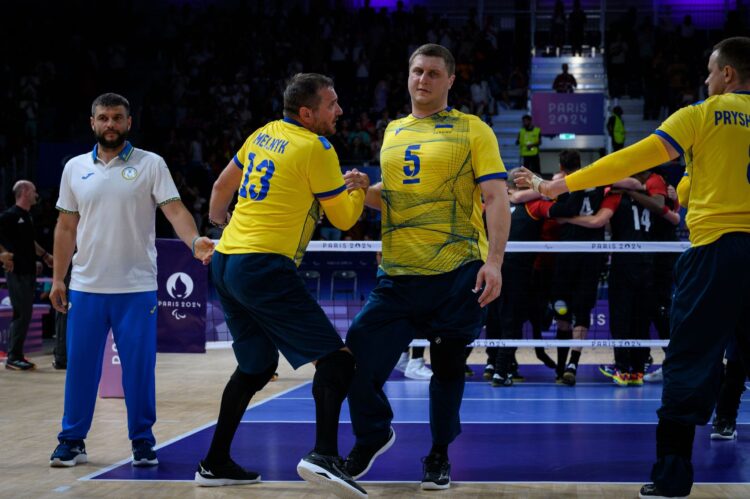
“It’s important for me – for all of us – to compete in the colors, coats of arms, and flags of my country,” he says, appreciating the support from the team and leadership.
The presence of 90 “neutral athletes” from Russia and Belarus, however, has caused significant discomfort and worry. Kharlamov and his team find it difficult to reconcile the reality of war with the idea of competing alongside athletes from the aggressor nation.
“We never communicate; we never even pass by them,” he explains, underscoring the emotional and ethical complexities faced by Ukrainian athletes at the Paralympic Games. However, Kharlamov and his team remain focused on their goals, respecting the rules and striving to represent Ukraine with dignity and resolve.
For Kharlamov, the Ukrainian Paralympic Team’s slogan, “Your Support is Our Victory” has deep significance.
For him, the slogan represents the critical need for inclusiveness in Ukraine, especially for people with disabilities. He speaks passionately about the necessity of accessible infrastructure – quality ramps, elevators, and low-floor transport – so that individuals with limited mobility, including pensioners, pregnant women, and those with disabilities, can move freely and independently through their cities. He points out that while many people take such facilities for granted, they are essential for creating an inclusive society. He hopes that after Ukraine’s victory, the country will develop this level of accessibility, much like what is already seen in Europe.
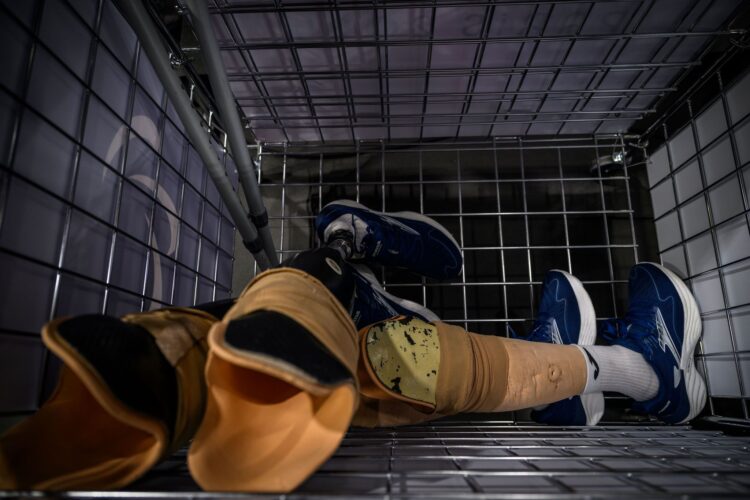
Kharlamov also offers advice to young, aspiring para-athletes, urging them to persist in their goals and not to be discouraged. He believes that sport is crucial for everyone, regardless of their physical abilities, and encourages those with disabilities to participate in physical activities. He highlights the inclusivity of his gym, which now offers CrossFit groups designed for people with disabilities. However, he knows that many people with disabilities in post-Soviet spaces are still hesitant to be visible in society, and he encourages them to take that step and be part of the community.
Ukrainian Paralympians push through loss and devastation to make history in Paris
He also encourages young athletes to seek advice and support from experienced Paralympians, assuring them that the doors of regional Invasport centers are always open for those interested in sports, whether at a recreational or competitive level.
“Don’t be afraid to go out, show yourself, and be part of society. Our space will become more inclusive when we are seen and heard.”
Related:
- Paralympics 2016: how Ukrainians fought their way into the Rio top three/
- Invisible but exist. Ukrainian people with disabilities struggle not to be marginalized/
- Paralympic medalist: “I removed my prostheses and showed ato soldiers that they can live without them”/
- Ukrainian Paralympians push through loss and devastation to make history in Paris/



